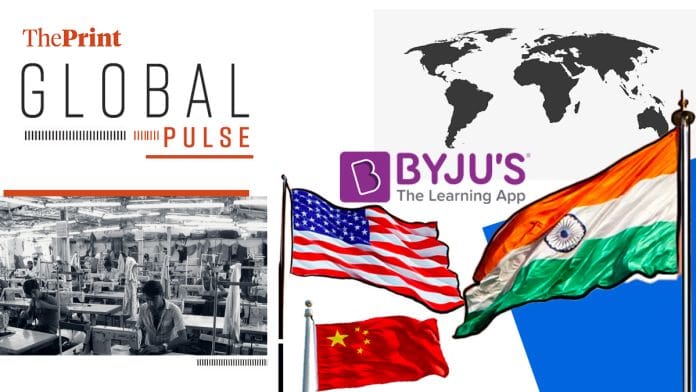New Delhi: Global media can’t get enough of a potential new world order with India and China at the helm, and it’s not just because it would be a departure from the Western axis: It’s also the economic potential of it all.
The BRICS annual summit was a triumphant display of just how far the group has come, writes Michael Kugelman, director of the Wilson Center’s South Asia Institute in Washington, in the BBC. He makes an important point on how an evolving and expanding BRICS can benefit India, arguably the “most Western-oriented Brics member”.
Delhi has plenty of bilateral and multilateral ties both within and outside the West, Kugelman writes. And it stands to gain by working with both Russia and China, despite Western efforts to isolate both countries.
“More broadly, Brics’ priorities are India’s priorities,” writes Kugelman in the BBC. The summit’s joint statement echoes the same goals and principles that India has—engaging with the Global South, advocating for UN reform, and “criticising the Western sanctions regime”.
“While India aims to balance its ties with the Western and non-Western worlds, it would not want to be part of any arrangement perceived as avowedly anti-West,” he cautions, before adding that such fears are unfounded.
“Brics today offers the best of all worlds for Delhi,” he continues — it enables India to work with several countries and offers an opportunity to “stake out more balance in its relations with the West and non-Western states, in an era when Delhi’s relations with the US and its Western allies (with the notable exception of Canada) have charted new heights”.
Global Times has a similar entreaty for India. In an editorial, it writes that increasing cooperation between India and China can only benefit trade.
“The reason why people believe that against the backdrop of a de-escalation in border tensions, economic and trade cooperation is likely to see new burgeoning opportunities is largely due to the vast potential for cooperation between the two countries,” the editorial observes. This potential spans manufacturing, infrastructure, and sustainable development: China has robust manufacturing capabilities and its industrial system is a well-oiled machine, while India has both a large market and the labour, along with an advantage in the IT and services industry.
The “complementarity” of India and China’s economy has already shown in bilateral trade: China is the largest trading partner of India in the fiscal year 2023-24, the report states, quoting PTI figures.
“The figures serve as a vivid example that in India’s pursuit of becoming a manufacturing power, its needs for industrial chain support have increased, especially in technology- and capital-intensive products, thus bringing more cooperation opportunities with China,” the editorial claims.
The cherry on top of the world order its envisioning would be officially “decoupling” from the US. “The pressures from the US “decoupling” strategy and technological restrictions have heightened regional tensions and increased geopolitical risks for both nations,” it says. Greater cooperation between India and China will allow for the resolution of regional issues while safeguarding common interests.
“Both countries are rapidly growing consumer markets with more than 1 billion people each, and how these two markets interact can be a driving force for the entire region and the world economy,” the editorial ends.
The Economist offers its two cents: Modi and Xi Jinping’s meeting at BRICS after the border patrolling agreement is a “détente which could shake up regional geopolitics again.” And it heralds a new phase of bilateral ties that clearly prioritises economic cooperation.
Xi Jinping, The Economist observes, wants better access to India’s market amid a slowing Chinese economy and plenty of trade barriers. India also needs more Chinese technology, investment, and expertise to realise its manufacturing goals.
The timing is perfect because it’s a fortnight before the American presidential elections. The signals are clear to the next American president: efforts to isolate China economically won’t work as it’s building relations with other democracies, and India is committed to a “multi-aligned” foreign policy even as it gets cosier with the US.
“The big question now is whether diplomatic reconciliation could turn into a prolonged period of economic integration between Asia’s giants. If that were to occur, it would indeed be a landmark of Himalayan significance,” it concludes
In a slightly less buoyant take on the Indian economy, a Financial Times editorial explains how venture capitalism can go wrong using the demise of Byju’s as a case study.
India’s most valuable start-up in 2022, it writes, is officially “worth zero.” Byju’s fall was a combination of several things—economic bad timing as interest rates rose following the pandemic and investors were forced to write off stakes worth hundreds of millions of dollars, coupled with governance problems highlighted by numerous legal battles that the company had to fight.
“Either way, this was clearly a poorly run company,” FT says. But the real question is what does its implosion tell us about its high-profile investors.
“Venture capitalists are by nature exuberant,” FT concedes. “It would not be the first time. Financiers appear to have exhibited similar excitement at co-working business WeWork, which filed for bankruptcy in the US last year, and FTX, the crypto exchange firm that collapsed in 2022.”
The first step is usually faith in the founder, which typically means “insufficient focus on the business model,” the FT writes. “Byju’s got distracted from its core digital learning product. FTX’s backers missed numerous accounting red flags, and WeWork’s series of long-term real estate leases were ultimately unsustainable.”
Venture capitalists often misjudge a business’s potential and in Byju’s case, several funders had board seats but don’t appear to have done much to hold management accountable.
“A better strategy for both ambitious start-ups and investors—particularly in India, as its VC landscape matures—may be to make haste more slowly, to ensure growth is built on firm foundations. After all, moonshots need solid launch pads,” the editorial ends.






